Capturing the spirit of the times
Updated: 2014-05-16 07:48
By Andrew Moody (China Daily Europe)
|
|||||||||||
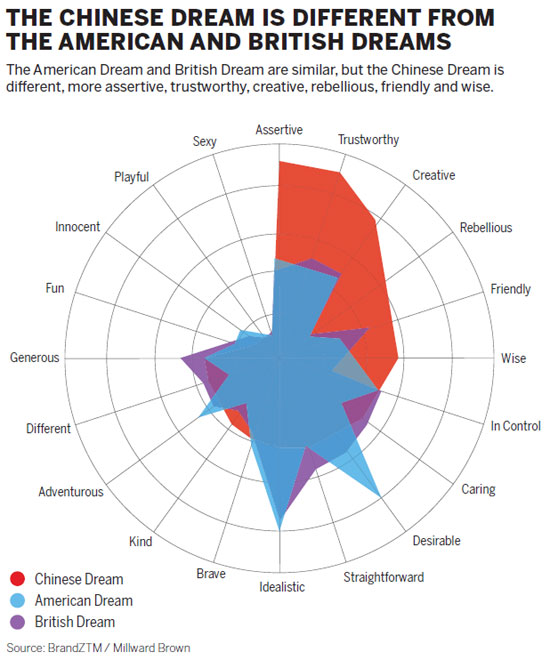
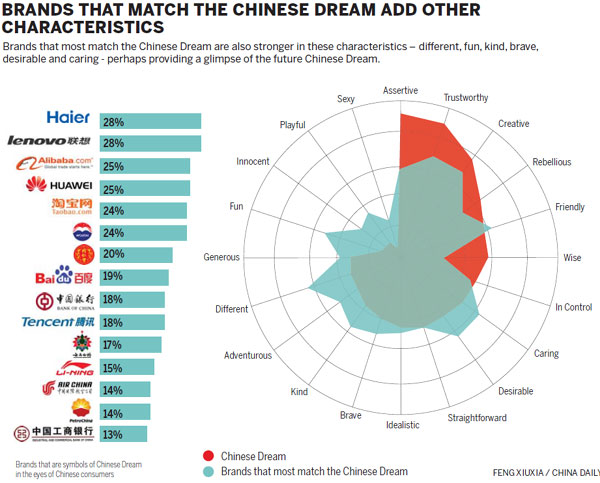


|
Mike Bastin, visiting professor at the University of International Business and Economics in Beijing. Kuang Linhua / China Daily |
|
Sherri He, a partner who specializes in consumer brands at international management consultants AT Kearney in Shanghai. Provided to China Daily |
|
Edward Tse, one of China's best-known management consultants and founder of Gao Feng Advisory. Wang Zhuangfei / For China Daily |
|
Tom Doctoroff, CEO, Asia Pacific, for advertising giant JWT, based in Shanghai. Zou Hong / China Daily |
Real challenge for companies is to establish some form of brand identity out of Chinese dream
If your brand is not creative, or even slightly rebellious, then it may not live up to the Chinese dream, according to a major new survey.
These are the qualities - along with being assertive, trustworthy, wise and friendly - that most match up to Chinese President Xi Jinping's vision for China's next decade.
The foreign brands that already fit into these categories include coffee chains Starbucks and Costa Coffee as well as ice-cream maker Haagen Dazs and restaurant franchise Pizza Hut.
Samsung, whose Galaxy handheld mobile devices are a hit among Chinese consumers, also makes the grade along with French cosmetics brand L'Oreal, US sportswear giant Nike and Red Bull, the caffeine-fueled energy drink.
The Chinese brands that most live up to the dream qualities include electrical goods maker Haier, computer company Lenovo, e-commerce giant Alibaba and global telecommunications major Huawei.
The findings come in a survey, The Power and Potential of The Chinese Dream, by advertising and public relations giant WPP, which looks at how both foreign and Chinese companies can align their brands to the new zeitgeist sweeping China.
Some 2,400 consumers were surveyed for the report, around 800 in China and the same number each in the US and the UK, so that international comparisons could be made.
The report suggests there are risks for brand owners who ignore the Chinese Dream since in at least three vital product categories - fashion, electronics and groceries - what it calls "phases of dreaming" (being inspired, having fun and learning something) are now ranked as more important for Chinese consumers than among those in either the US or the UK.
These three "dreaming" phases are given a score of 204 out of 300 in China, compared to just 128 in the US and 122 in the UK.
Doreen Wang, deputy managing director of Millward Brown China, the global research consultancy arm of WPP, who worked on the report, says it is important for foreign companies operating in China to recognize the power of the Chinese Dream message.
"What we observed in our report is that international companies need to leverage the Chinese Dream and integrate it into their marketing strategies since it is one of the most important government messages that has been delivered recently.
"It will have a huge impact over the next decade and any business operating in China needs to be part of it."
According to the WPP report, companies operating in China have to be aware of meeting not just personal dreams of individuals but also aligning their brands with the national dream of becoming a wealthier and more powerful nation.
For 69 percent of the Chinese surveyed, their personal dream is interdependent with the national dream, whereas with American consumers this is less the case with only 55 percent saying they are linked to the national dream.
Ben Cavender, an analyst at China Market Research Group in Shanghai, says a lot of brand strategists are actually trying to grasp the Chinese Dream concept.
"They are trying to understand it. This phrase is being tossed around but everyone has got a slightly different take on what it means."
Cavender says that even if companies don't fully understand the concept, it should be picked up in their market research if it has any deep significance among Chinese consumers.
"Certainly companies operating in China are doing a lot more research and positioning and having more dialogue with consumers. For a long time brands were just pushing what worked in other markets but now they have moved away from that," he says.
"Where the Chinese Dream concept may work best is with younger consumers. They are looking to improve their lives and looking for new experiences such as wanting to travel more. Brands that can meet these expectations are likely to succeed more."
Sherri He, a partner who specializes in consumer brands at international management consultants at AT Kearney in Shanghai, says foreign companies may adopt different strategies when it comes to the Chinese Dream between their public relations and advertising communications.
"With their public relations when it comes to senior figures of companies giving interviews or in their press releases they may make reference to the Chinese Dream. They are less likely to use the term in their advertising since I don't think it will necessarily work with consumers, even though the messages behind it would," she says.
According to the survey, the Chinese associate having their own strong brands in international markets with national power. Some 67 percent said this was the case with only 25 percent being neutral on the issue and 8 percent disagreeing.
Some 42 percent of Chinese consumers also believed that great brands like Apple and IBM have increased the US' standing in the world.
A majority of Chinese (56 percent) were confident that China would have similar brands in the future with only 12 percent believing that they wouldn't.
Mike Bastin, visiting professor at the University of International Business and Economics in Beijing and senior lecturer at Southampton Solent University's School of Business in the UK, says the Chinese Dream could be partly the passport through which Chinese brands make an impact on the world stage.
"Some of the national and personal values that underpin the Chinese Dream such as ambition, creativity, self-belief and team work are what is needed if Chinese brands are going to make it to the next level," he says.
"There has to be a wholesale change of business culture. Companies like Lenovo and Huawei have already made great strides in this direction. I think changing the business culture and building brands is easily the most important Chinese Dream."
While the Chinese Dream might be important for driving forward Chinese brands, it is more difficult for foreign brands to meet concepts of the Chinese Dream when they are often associated with dreams of other countries.
According to the WPP report, iconic American brands such as KFC, Apple, Nike, Colgate and McDonald's scored less well than Chinese iconic brands such as China Mobile, Mengniu, the food and dairy company, and retailer Suning in Chinese Dream values such as trustworthiness and social responsibility.
Wang Gao, professor of marketing at the China Europe International Business School in Shanghai, believes it is very difficult for foreign companies to align themselves with any concept of China's national dream since they have automatic foreign associations.
"The China national dream is actually about becoming a strong country. I don't know what international brand can actually associate with that. If a brand comes from the United States, it is about the United States being strong so they can occupy your market. It is almost the opposite concept," he says.
According to the WPP research, there is no doubt the Chinese Dream concept resonates among Chinese consumers. Some 70 percent said realizing the dream was important to them.
It was the most important, however, to those in the 30-39 age category of whom 76 percent said it was important. That was even ahead of the 18-29-year-olds, of whom 71 percent said it was important. The concept is slightly less important to 40-49-year-olds (69 percent) and markedly less so among those over 50 (64 percent).
Tom Doctoroff, CEO, Asia Pacific, for advertising giant JWT, based in Shanghai and also author of What Chinese Want, a 2012 book which analyzed Chinese consumer behavior, says that it is not necessarily the phrase itself that impacts on Chinese people but the messages that lie behind it.
"The reason why the Chinese Dream registers with Chinese people and is therefore very important in terms of brands is that it combines ambition and projections of status while at the same time it is leavened by trenchant insecurity and the need for self-protection. I think it is less to do with the government messages on this," he says.
"I think for foreign companies in China it is not about slapping the Chinese Dream on print heads or beer cans."
Wang at CEIBS is more skeptical as to whether the Chinese Dream has any real resonance with Chinese consumers. According to the WPP survey, 89 percent of respondents in China knew about the Chinese Dream, compared to 73 percent of Americans knowing about their American Dream and only 13 percent in the UK having any notion of a British dream.
"I think that is hardly surprising given the amount of focus there has been in China about the dream.
"I think also that a lot of the supposedly Chinese Dream desires of consumers in this survey are really only the natural desires of aspirational consumers. Of course they want to have a better life and afford more things. Nothing more than that."
He at AT Kearney says that contrary to the WPP report, the Chinese Dream as yet is not high on boardroom agendas.
"It is topical but it is not a hot topic. We have some clients in the consumer sector and we have been talking about branding and I have not heard them say we want one of their brand attributes to be the China Dream. I have not heard that come up as an objective, though these brands are keen to highlight key attributes that are linked to the Chinese Dream, such as being healthy and trustworthy," she says.
Wang at Millward Brown accepts that some companies will be dismissive of the Chinese Dream or pay little attention to it.
"If they ignore it, it is no problem. I think, however, it will be to their advantage if they consider it in some way and try to leverage it in some way an to emotionally connect with their consumers."
Edward Tse, one of China's best known management consultants and founder of Gao Feng Advisory, a new Chinese management consultancy, says whether anyone believes in the concept or not it will create a lot of market churn since it will result in new goals and targets.
"The Chinese people will want the government to drive progress going forward. This will create new opportunities. For many multinationals the key will be in being able to identify these new demand opportunities that are coming as a result of the Chinese Dream."
The dream could create opportunities in other fields as there is a move to capture the spirit of the times.
One area where this might be the case could be in architecture with both foreign and Chinese companies trying to capture the concept in buildings and urban space.
Austin Williams, associate professor in architecture at Xi'an Jiaotong-Liverpool University in Suzhou, says China may be on the brink of major change in architectural direction that may reflect the new dream.
"I think it is a very interesting turning point in the architectural community. You are having all these returnees now coming from the West with this fantastic CV advantage of having a seat in both camps. They are not only fully versed in the aesthetic ambitions of Western architecture but also are aware of the urban subtlety required in China.
"I think China has suffered from having some rather indifferent Chinese architecture and then also Western architecture. These new architects will be able to define this new vision of the country."
Bastin at the University of International Business and Economics in Beijing says the challenge for Chinese companies is to establish some form of brand identity out of the Chinese Dream.
"Chinese companies are still often associated with cheap products. They need to move on from that. They need to create emotive associations with their products. France, Italy and Germany have managed to build strong country associations with products from shoes, clothes and cosmetics to cars and even food and drinks brands," he says.
"But China with its 5,000 year history and with one of the deepest cultures has failed to do that. Chinese companies need to harness this and the Chinese Dream is a great opportunity."
Wang at Millward Brown believes the Chinese Dream will have a resonance in many ways over the next decade which many in the business community have not fully come to terms with.
"In a very dynamic market like China's there will be a lot of change over the next 10 years. Business will need to know how the Chinese Dream will impact in their business and it may soon become a priority for them to find out."
andrewmoody@chinadaily.com.cn
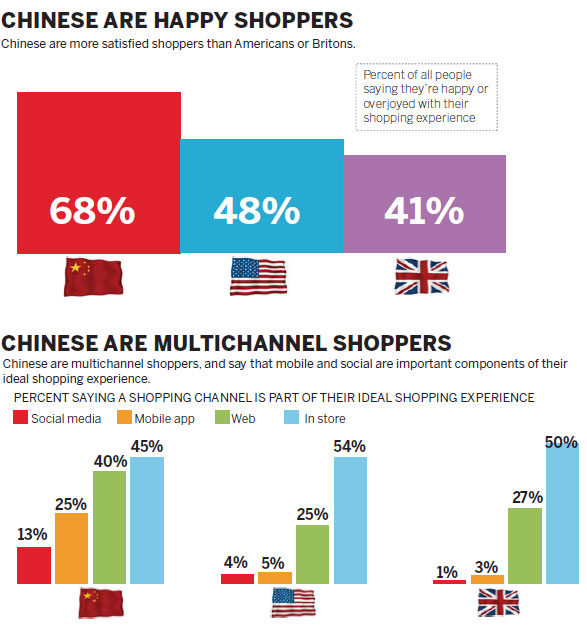
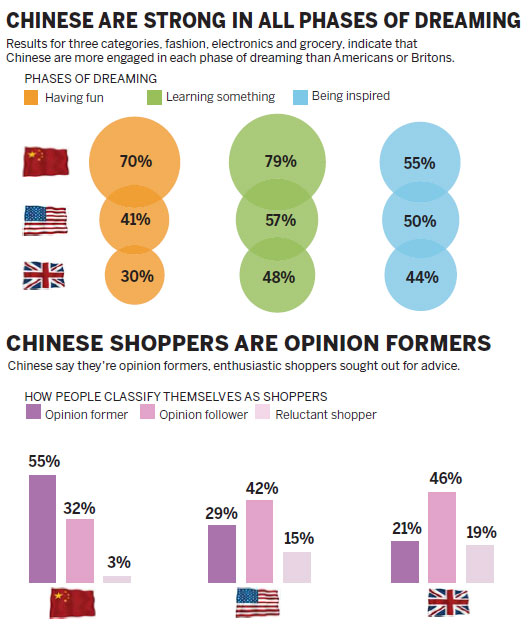
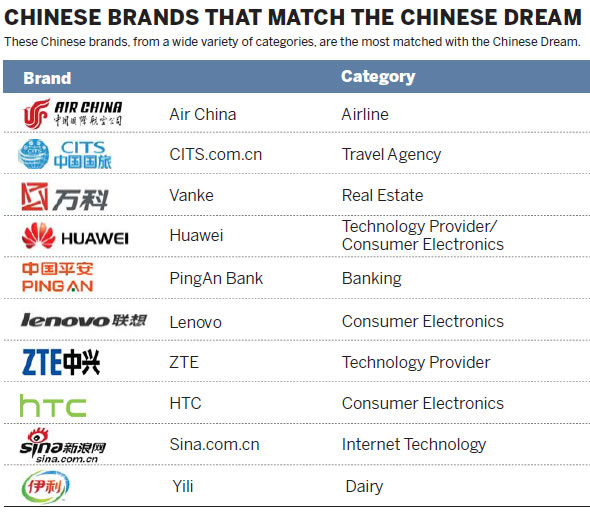
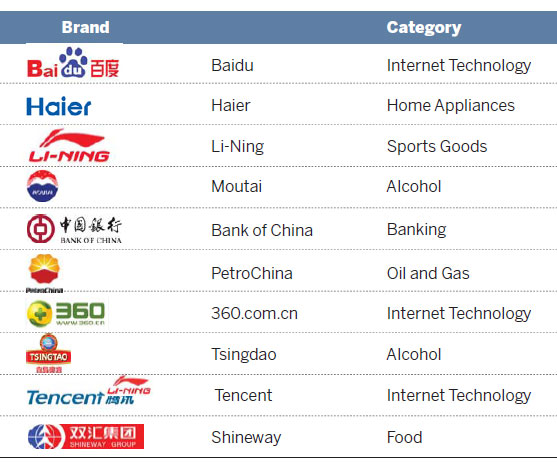
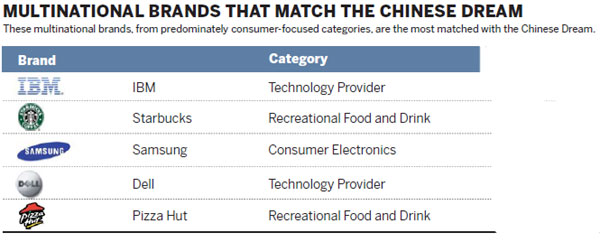
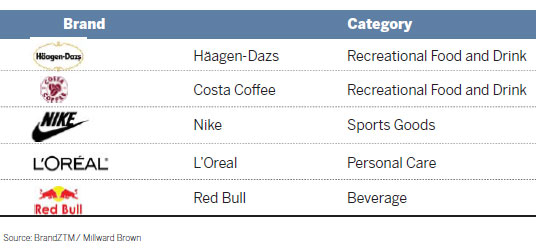
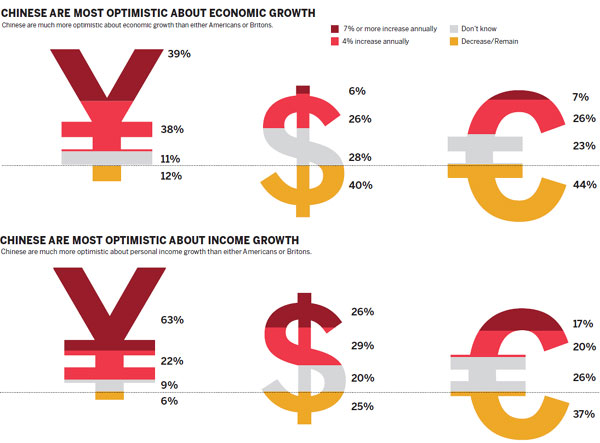
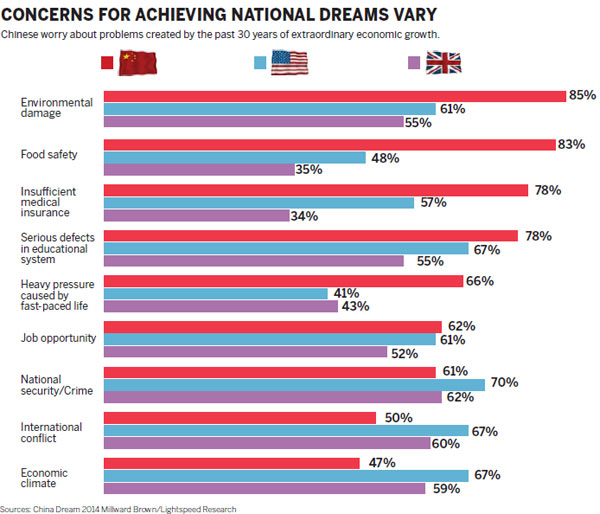
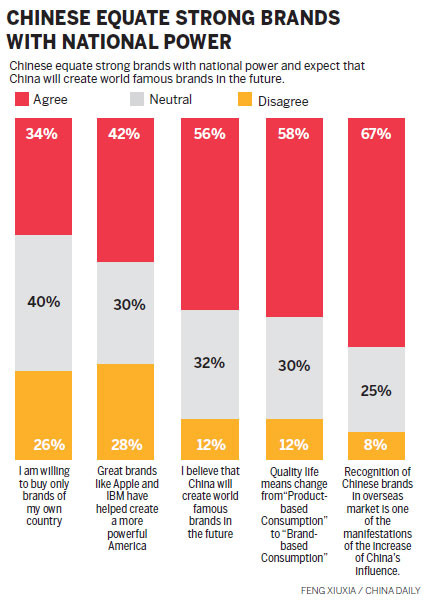
(China Daily European Weekly 05/16/2014 page6)
Today's Top News
Egypt angered about China's fake Sphinx
Poroshenko wins Ukraine election - exit poll
Euro elections reflect EU consensus
Pope calls for Israel-Palestine peace
Click profit online in China
Ukraine's presidential polls backfire
EU-wide elections could shake up the bloc
Beijing urges to intensify terror fight
Hot Topics
Lunar probe , China growth forecasts, Emission rules get tougher, China seen through 'colored lens', International board,
Editor's Picks

|

|

|

|

|

|









